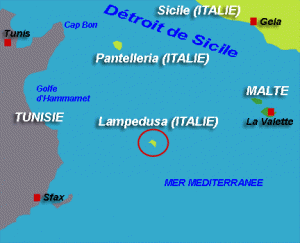
 Nathalie Griesbeck a signé, aux côtés de sa collègue suédoise Cécilia Wikström, une question orale demandant des comptes à la Commission européenne et au Conseil de l’Union Européenne quant aux mesures prises par l’Union Européenne concernant la situation des migrants, demandeurs d’asile et réfugiés sur l’île de Lampedusa, les morts en Méditerranée etc. depuis l’an dernier. En effet, une délégation du Parlement européen s’était rendue sur place en novembre 2011 (Nathalie Griesbeck et Marielle De Sarnez s’étaient également rendues sur l’île dramatiquement célèbre de Lampedusa en juillet 2011) et avait demandé davantage d’informations à la Commission européenne concernant les arrivées de migrants, la situation dans les camps de migrants à Lampedusa, les fonds européens utilisés, les mesures prises pour éviter les morts en mer etc. et aucune réponse n’a jusqu’à présent été apportée aux parlementaires.
Nathalie Griesbeck a signé, aux côtés de sa collègue suédoise Cécilia Wikström, une question orale demandant des comptes à la Commission européenne et au Conseil de l’Union Européenne quant aux mesures prises par l’Union Européenne concernant la situation des migrants, demandeurs d’asile et réfugiés sur l’île de Lampedusa, les morts en Méditerranée etc. depuis l’an dernier. En effet, une délégation du Parlement européen s’était rendue sur place en novembre 2011 (Nathalie Griesbeck et Marielle De Sarnez s’étaient également rendues sur l’île dramatiquement célèbre de Lampedusa en juillet 2011) et avait demandé davantage d’informations à la Commission européenne concernant les arrivées de migrants, la situation dans les camps de migrants à Lampedusa, les fonds européens utilisés, les mesures prises pour éviter les morts en mer etc. et aucune réponse n’a jusqu’à présent été apportée aux parlementaires.
Voici le texte de la question orale :
A delegation of the European Parliament LIBE committee visited Sicily on 24-26 November 2011 to monitor centres for migrants. Following the visit, further information has been requested to the Italian authorities, which failed to provide them up to now. These elements are paramount to understand what happened in 2011 and ensure that migratory and protection challenges are met appropriately. In the meantime, 5 persons were found dead in boats carrying hundreds of people that arrived to Lampedusa after the 17th of March. 74 Somali migrants were kept in a Tunisian fishing boat South of Lampedusa for 3 days, before being sent back to Tunisia. Can the Commission / the Council provide, including by requesting this information to the Italian authorities, detailed information notably related to: 1) the follow up that the EU and Italy intend to give to implement the ECHR judgment of Grand Chamber judgment in the case of Hirsi Jamaa and Others v. Italy, condemning the Italian decisions to return migrants to Libya without examining their case, for exposing them to a risk of ill-treatment, and which furthermore amounted to a collective expulsion? 2) detailed information on the recent arrivals and the way the emergency has been handled? 3) Lampedusa: dates and size of migrants’ arrivals, of persons hosted in each centre, transfers from Lampedusa to other centres on the mainland? The legal framework and the reasons for declaring the Lampedusa port as an « unsafe harbour » for migrants and if the decision is expected to be reviewed and when? the timeframe for the restructuration of the Lampedusa centre and the legal framework and reasons for closing it to media and to the Council of Europe delegation, and if such decision will be reviewed and when? 4) the legal framework for Centres of Identification and Expulsion (CIEs) and Hosting Centres for Asylum Seekers (CARAs) and why asylum seekers in CIEs are not transferred to CARAs once these request asylum? Detailed data related to the processing of asylum requests and their outcome? 5) the texts of the current and previous agreements between Italy and Tunisia and Libya and detailed information on their practical implementation, namely after the visit of the Italian PM in Lybia in January 2012? 6) information on the management of the CIEs and CARAs in Sicily, both for the location of the structures and for the contracting agencies? Whether reception conditions (necessary renovation works in the CARA of Salina Grande; assistance and appropriate clothes in the CARA of Mineo) have been enhanced? 7) assurances on the continuation of the Presidium project in the next years? 8. EU funds received and how they have been used in relation to migration management in 2011 and 2012, and detailed information on the Frontex activities in Sicily?
Zoom sur … Les questions orales : Une commission parlementaire, un groupe politique ou 40 députés peuvent poser des questions à la Commission ou au Conseil et demander à ce que ces questions soient inscrites à l’ordre du jour de la session plénière du Parlement Européen. Un débat entre les députés et avec le Conseil ou la Commission a ensuite lieu pendant la session plénière.
30 mars 2012